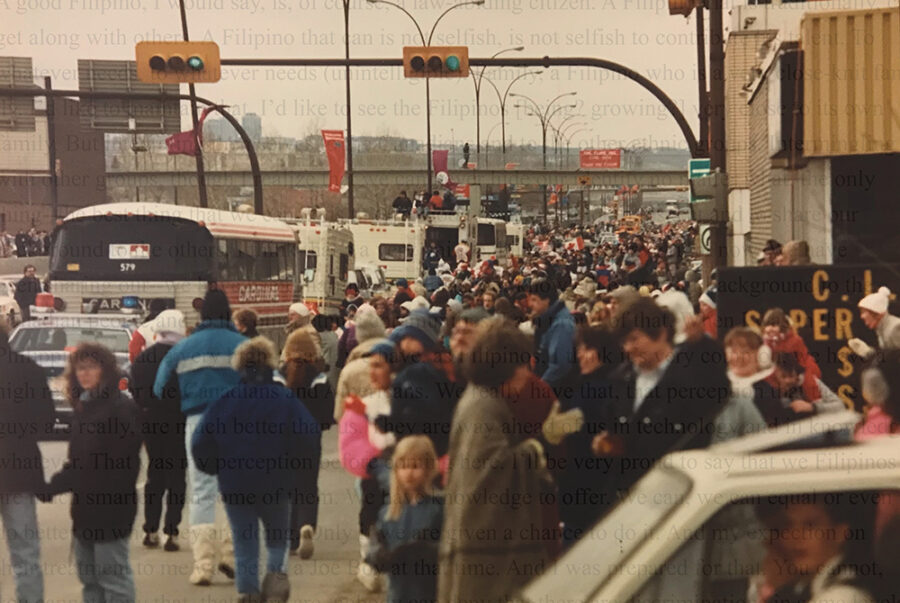From Issue 3.50: In(ter)ventions in the Archive (Summer 2023)
After Luis Romualdez
I was born in an island called Leyte.
It’s somewhere in the central Philippines,
Visayan region, as we refer to it.
I was born in a real rural setting.
Behind us was the sea.
After Peter Ulanday
i: Could you please state your name? And spell it for—
(overlapping) It is pronounce here “Youlandy,”
although in our country it’s “Ulanday.”
although it is our obligation also to—
what do you call that—
abide by the prevailing, by the—
what do you call it—
the prevailing—
i: Laws?
(overlapping) Social order here.
although he will say it in the clever way.
He was somebody in the Philippines.
although I still can work,
They will report you to the police.
How funny.
although they are married
love is also not so much the way we do
I don’t know. I cannot understand.
They like us, I observe.
they like us too because we are, we are—
what do you call this?
Amenable to their ways of life.
We can assimilate ourselves,
but we can also keep—
(a phone rings twice)
After Lucila de Obieta
Cold! Very cold!
there wasn’t any pollution,
there wasn’t any noise
And it was the, the quietness
It feels like you’re in a dark room
and you just hear bzzzzzzzzzzzzzzz
you hear a buzzing sound
I’ve had sleepless nights.
I couldn’t sleep for a month
And I get up from bed and I just wonder,
gee, is this Calgary?
brown, no trees.
if you go to the Philippines,
there’s a lot of trees,
there’s a lot of pollution,
a lot of green stuff.
Where are all the flowers?
mother nature have in Calgary this way,
the plantation not having flowers
All these pine trees, you know?

After Clem Tigley
i: Are you a Canadian citizen now?
[quieter]
Oh yeah, of course.
i: In your mind, what, what about you is Canadian?
What is Filipino?
Okay,
actually the fact of life is,
in your blood still grants your original country
where you came from.
You can never change that.
you can never change,
you can never hide yourself as,
as whatever, whatever country
you came from
or whatever (unintelligible)
you were born in.
You are still a Filipino.
I am still a Filipino.
back in my mind,
and in my blood,
I can say I am still a Filipino.
After Clem Tigley
if the community is strong
and the community can have a very good voice
and have a united voice
this is
like
learning to dance
my heart just goes up
(children laughing in the background)
This excerpt draws from a longer work that examines how poetry may respond to diasporic archives. The text from these found poems is taken from four interviews in the Peoples of Southern Alberta Oral History Project, a collection of audio cassettes housed at the University of Calgary’s Glenbow Archives. The recordings, created in 1988 and made crackly and fragmented by their later digitization, are difficult to hear. They require a listening practice that attends to the ineffable, extra-linguistic, and poetic qualities of audio archives. The interviewees recorded are Lucila de Obieta, Luis Romualdez, Clemente Tigley, and Peter Ulanday, and the interviewer is Miriam Tuazon. This excerpt also includes an image from my family’s photo archives, taken in Calgary during the 1988 Winter Olympics.

